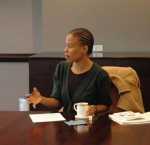Scholar shares story of African

By Steve Moyer
Nevada Daily Mail
A Namibian doctoral student and recipient of a P.E.O. scholarship was interviewed by a Cottey College student recently in the president's office at Cottey's main hall. Julie Daniels, a second-year journalism student questioned Hikuepi Katjiuongua, known as Epi, on her work.
Katjiuongua was awarded the P.E.O. International Peace Scholarship and is a doctoral student in the Agricultural Economics Department at Michigan State University. Her research interests are in food security, regional trade integration and poverty issues in Africa.
Katjiuongua has worked as a volunteer in her country on projects dealing with physical abuse and rape of women, education of girls and HIV/AIDS awareness.
Katjiuongua started her collegiate journey with a scholarship from a mining company to a college in Britain. She then came to the United States and went to McCallister College where she finished her undergraduate degree. She obtained her masters from Michigan State where she is enrolled in the doctoral program.
Namibia gained its independence from South Africa in 1990 and Katjiuongua and her family participated in the independence movement.
"I had uncles active in the SWAPO, the South West African Peoples Organization," Katjiuongua said. "Many students were active against the South African regime. In 1988 I went to a political rally with my sister and I lost her in the chaos and my uncles were arrested."
Katjiuongua said that different groups in Namibia pulled together, possibly because it took so long for the country to gain independence.
"Because we got our independence so late there was always a unifying cause-gaining our independence," Katjiuongua said. "So we didn't have the problems with different groups pulling in different directions."
A large problem remains for the country, the unequal land distribution. Solving it will require good will efforts from all sides of the issue if Namibia is to avoid the fate of Zimbabwe, where land-owners are often forced from the land their families have farmed for generations, often violently.
"A big problem remaining is land redistribution," Katjiuongua said. "We don't what to have what happened in Zimbabwe happen to us but you do need to do something. People don't want to touch the issue."
